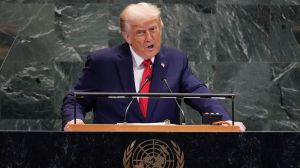Should you be exercising on an empty stomach? Know more from celebrity coach
This is more myth than fact. Fat loss is governed by the daily fat balance in the body: fat stored versus fat released. As fasted cardio doesn’t considerably shift this balance over time, its benefits for fat loss are limited. Focus on fat release over fat storage through diet and strength training, says functional medicine expert and celebrity lifestyle coach Vijay Thakkar
 Fat loss is governed by the daily fat balance in the body: fat stored versus fat released. (Source: Getty Images/ Thinkstock)
Fat loss is governed by the daily fat balance in the body: fat stored versus fat released. (Source: Getty Images/ Thinkstock) The world of fitness and nutrition is no stranger to debates, and the topic of fasted cardio for weight loss is a noteworthy contender. Fasted cardio refers to doing a cardio workout before eating anything in the morning. As fitness enthusiasts grapple with optimal strategies for shedding weight, let’s delve into the research surrounding this topic and demystify whether exercising on an empty stomach really has an edge.
What is Fasted Cardio?
Fasted cardio refers to cardiovascular exercises performed after an overnight fast, usually before consuming a morning breakfast. The idea is that without readily available glucose from food, the body will switch to its alternative energy source, burning body fat as the primary energy source, thereby accelerating fat loss.
Understanding the science
The argument for fasted cardio finds some plausible and logical backing in physiology. After an overnight fast, our insulin levels are low, and the carbohydrates stored in the body, namely in the liver, known as liver glycogen, are somewhat depleted. Under these conditions, the body increases the breakdown and release of body fat for use as energy, known as lipolysis. Organs and muscles burn this fat to give us energy, known as the oxidation of free fatty acids, a type of fat found in our bloodstream that is taken up by almost every cell in the body. So, in theory, when we do fasted cardio, we would proportionately burn more fat than carbs to fuel the activity. Sounds promising, doesn’t it?
But what about energy balance?
However, while the aforestated mechanism might point towards a preference for fat burning during exercise in a fasted state, we need to consider the bigger picture: the total daily energy balance maintained throughout the day. Energy balance in the body refers to the difference in the amount of energy the body gets through the food and drinks we consume and the amount of energy the body burns throughout the day to stay alive, digest food, move and exercise. So, for example, if we eat 2,000 calories and burn 2,200 calories, we are in a negative energy balance. The body will take up 200 calories from the fat stores, causing fat stores to shrink. Suppose it is vice versa, that we consume 2,200 calories and burn 2,000 calories. In that case, the body is in a positive energy balance, and we store 200 calories in body fat.
So to test if fasted cardio has the edge over fed cardio, a 2014 study conducted by Schoenfeld et al found that, although fasted cardio led to a higher proportion of fat being burnt during that particular exercise session, however, there’s no significant difference in overall fat loss over 24 hours compared to those who ate before working out. So when we translate this finding into multiple days, weeks, and so forth, we would see an insignificant difference in fat loss over that time.
The bigger picture
Fat loss is governed by the daily fat balance in the body: fat stored versus fat released. As fasted cardio doesn’t considerably shift this balance over time, its benefits for fat loss are limited. Instead, we should focus on increasing fat release over fat storage throughout the day by improving our dietary choices and engaging in strength training to build up muscle tissues where glucose can be quickly stored so that the body will swiftly start using fats for its energy needs throughout the day. This strategy will significantly shift the needle towards low insulin levels and, thus, more daily fat release over storage.
Moreover, a 2011 study published in the International Journal of Sports Nutrition and Exercise Metabolism found that fasted training might diminish exercise intensity. Some individuals might thus burn fewer calories than if they’d eaten and trained with greater vigour.
Is there a place for fasted cardio? Yes, especially for those who benefit from morning consistency. It might suit those who like exercising on an empty stomach or those integrating workouts with intermittent fasting. However, current studies show enhanced fat loss due to fasted cardio appears more mythical than a fact. Prioritizing regular training and a balanced diet—rich in fibre, protein, and slow digesting complex carbs—will regulate blood sugar and insulin, facilitating a quicker switch from glucose to fat burning throughout the day, essential for weight loss.
(Vijay Thakkar is a functional medicine expert and celebrity fitness coach in Mumbai. He is author of the best-selling book “Eating Less is Making You Fat,” aimed at dispelling misinformation about nutrition, calorie-deficit diets, metabolism and how hunger and satiety work)
Photos



- 01
- 02
- 03
- 04
- 05




























